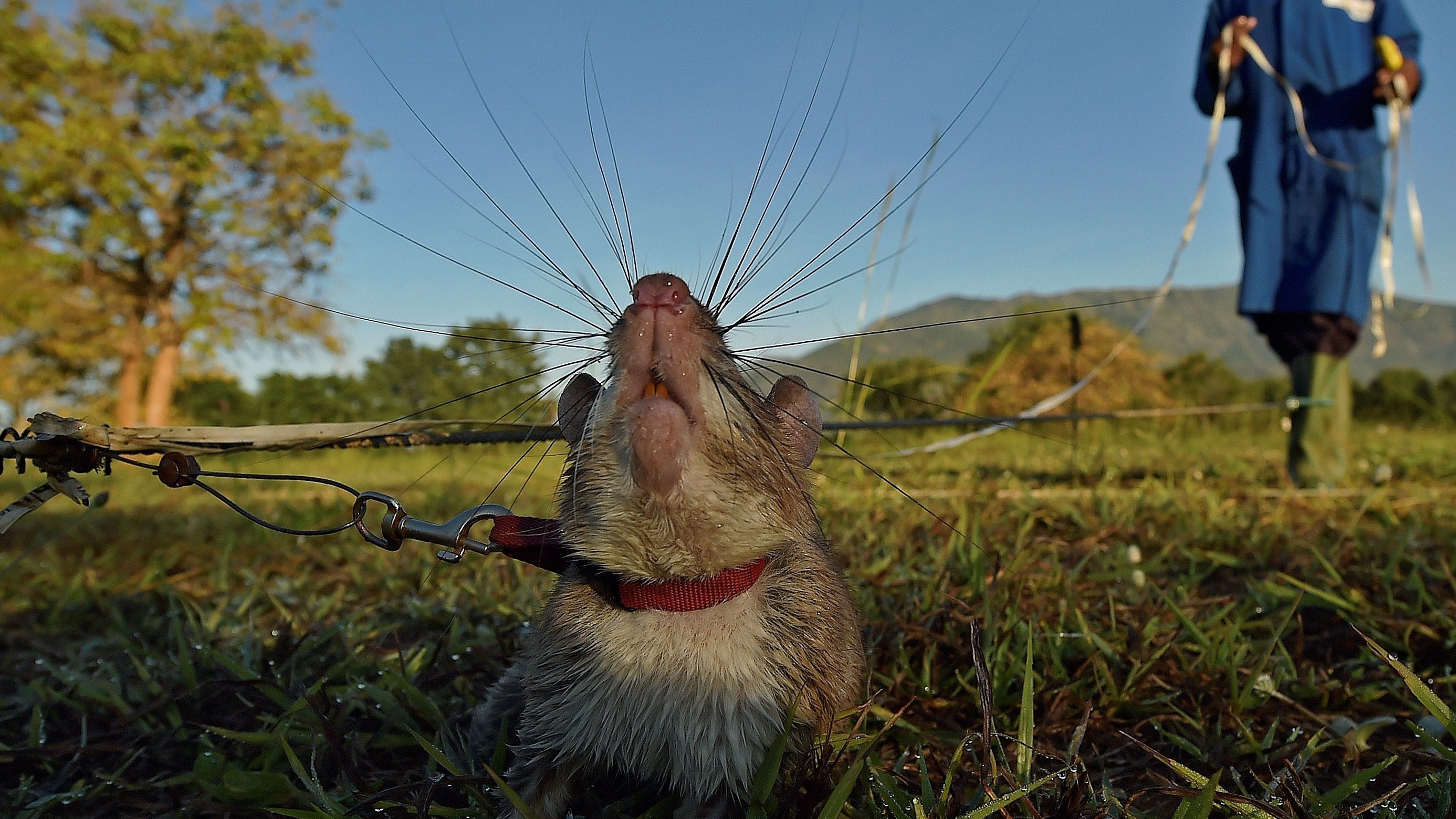Gold medal for bravery awarded to Magawa the bomb-sniffing rat
The hero rodent has helped landmine charity to root out deadly explosive devices in Cambodia

A free daily email with the biggest news stories of the day – and the best features from TheWeek.com
You are now subscribed
Your newsletter sign-up was successful
Rats often get a bad rap, but now one heroic rodent is being hailed for his work in sniffing out landmines in Cambodia.
Magawa, an African giant pouched rat, has been presented with the PDSA veterinary charity’s Gold Medal - described by The Guardian as the “animal equivalent of the George Cross” - for detecting a total of 39 landmines and 28 unexploded munitions in the formerly war-torn Southeast Asian country. The miniature medal is inscribed with the words: “For animal gallantry or devotion to duty.”
Magawa was trained by Tanzania-based charity Apopo, “which has been raising the animals - known as Hero Rats - to detect landmines and tuberculosis since the 1990s”, the BBC reports.
The Week
Escape your echo chamber. Get the facts behind the news, plus analysis from multiple perspectives.

Sign up for The Week's Free Newsletters
From our morning news briefing to a weekly Good News Newsletter, get the best of The Week delivered directly to your inbox.
From our morning news briefing to a weekly Good News Newsletter, get the best of The Week delivered directly to your inbox.
The seven-year-old medal-winner is Apopo’s “most successful Hero Rat, having cleared more than 141,000 square metres of land - the equivalent of 20 football pitches”, adds the Daily Mail.
He is also the first of his species to be awarded the medal by PDSA in the London-based charity’s 77-year history.
Apopo chief executive Christophe Cox said that “to receive this medal is really an honour for us. Especially for our animal trainers who are waking up every day, very early, to train those animals in the morning.
“But also it is big for the people in Cambodia, and all the people around the world who are suffering from landmines. The PDSA Gold Medal award brings the problem of landmines to global attention.”
A free daily email with the biggest news stories of the day – and the best features from TheWeek.com
According to landmine clearance charity The Halo Trust, “over 64,000 casualties and more than 25,000 amputees have been recorded” in explosive accidents in Cambodia since the fall of the Khmer Rouge in 1979.
The trust says that although “around half of Cambodia’s minefields have been cleared”, the remainder are largely concentrated in an area near the Thai border that is known as the K5.
The area was heavily mined to stop people from crossing the border to escape the brutal Khmer Rouge regime, which is believed to have killed almost two million people during a four-year reign of terror.
Joe Evans is the world news editor at TheWeek.co.uk. He joined the team in 2019 and held roles including deputy news editor and acting news editor before moving into his current position in early 2021. He is a regular panellist on The Week Unwrapped podcast, discussing politics and foreign affairs.
Before joining The Week, he worked as a freelance journalist covering the UK and Ireland for German newspapers and magazines. A series of features on Brexit and the Irish border got him nominated for the Hostwriter Prize in 2019. Prior to settling down in London, he lived and worked in Cambodia, where he ran communications for a non-governmental organisation and worked as a journalist covering Southeast Asia. He has a master’s degree in journalism from City, University of London, and before that studied English Literature at the University of Manchester.
-
 Local elections 2026: where are they and who is expected to win?
Local elections 2026: where are they and who is expected to win?The Explainer Labour is braced for heavy losses and U-turn on postponing some council elections hasn’t helped the party’s prospects
-
 6 of the world’s most accessible destinations
6 of the world’s most accessible destinationsThe Week Recommends Experience all of Berlin, Singapore and Sydney
-
 How the FCC’s ‘equal time’ rule works
How the FCC’s ‘equal time’ rule worksIn the Spotlight The law is at the heart of the Colbert-CBS conflict
-
 Epstein files topple law CEO, roil UK government
Epstein files topple law CEO, roil UK governmentSpeed Read Peter Mandelson, Britain’s former ambassador to the US, is caught up in the scandal
-
 Iran and US prepare to meet after skirmishes
Iran and US prepare to meet after skirmishesSpeed Read The incident comes amid heightened tensions in the Middle East
-
 Israel retrieves final hostage’s body from Gaza
Israel retrieves final hostage’s body from GazaSpeed Read The 24-year-old police officer was killed during the initial Hamas attack
-
 China’s Xi targets top general in growing purge
China’s Xi targets top general in growing purgeSpeed Read Zhang Youxia is being investigated over ‘grave violations’ of the law
-
 Panama and Canada are negotiating over a crucial copper mine
Panama and Canada are negotiating over a crucial copper mineIn the Spotlight Panama is set to make a final decision on the mine this summer
-
 Why Greenland’s natural resources are nearly impossible to mine
Why Greenland’s natural resources are nearly impossible to mineThe Explainer The country’s natural landscape makes the task extremely difficult
-
 Iran cuts internet as protests escalate
Iran cuts internet as protests escalateSpeed Reada Government buildings across the country have been set on fire
-
 US nabs ‘shadow’ tanker claimed by Russia
US nabs ‘shadow’ tanker claimed by RussiaSpeed Read The ship was one of two vessels seized by the US military